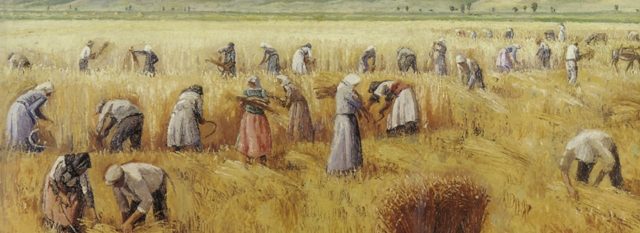
Thucydides’ Revelation of Our Indebtedness
Thucydides opens his “History of the Peloponnesian War” by tying the capability for a truly great war with the stable growth of a culture. He argues that the Peloponnesian was the greatest war because no cultures, to his knowledge, had attained sufficient stability and wealth to wage a greater war. As part of this argument, he writes:
“It is evident that the country now called Hellas had in ancient times no settled population; on the contrary, migrations were of frequent occurrence, the several tribes readily abandoning their homes under the pressure of superior numbers [1.1].”
In other words, this was an unsettled time, full of conflicts, migrations and changes. Such unrest did not allow for the growth of a culture capable of generating sufficient wealth to wage war on a large scale. He goes on to describe this condition in greater detail:
“Without commerce, without freedom of communication either by land or sea, cultivating no more of their territory than the necessities of life required, destitute of capital, never planting their land (for they could not tell when an invader might not come and take it all away, and when he did come they had no walls to stop him), thinking that the necessities of daily sustenance could be supplied at one place as well as another, they cared little about shifting their habitation, and consequently neither built large cities nor attained to any other form of greatness [1.2].”
Military strength (especially in the form of a navy) was requisite to disrupt invaders, allowing for “the quiet which must precede growth,” a “durable tranquility undisturbed by removals,” which allows for the “acquisition of wealth” and the gradual building of culture [1.12].
The Source of Stability and Specialization: Farming
While military strength is essential as a protective measure, the heart and soul of culture is farming. Culture, we might say, is built on farming. It is the surplus produced by some members of the community that allows for other members to turn their attention elsewhere, whether to the military, the building of city walls, or other more advanced aspects of civilization. It seems clear from the first few pages of Thucydides’ book that while the military is important, the roots of civilizations lie in their respective soils, and the wealth of the community and its ability to sustain cultural development rests upon the shoulders of the farmers.
But this raises interesting implications for education. If Thucydides is right, Biola and other universities rest on the shoulders of farmers. We faculty, and all our students, are afforded the leisure of working in areas not directly related to the production of food. And without the massive surplus of food generated by others, the university system would need to be utterly revised, mostly around food.
Because this is the case, we had best be aware of our debt, and grateful. Without farmers excelling at their craft, there are no professors excelling at theirs.
So how does the university shows its gratitude?
How does Georgetown support the local Grange, and D1 schools support 4H? We don’t necessarily have to show a direct and unmediated connection between the two, though of course there are schools known for the emphasis on agriculture which do just this—but the question stands: how do we benefit the farmer, who so greatly benefits us?
The question itself is valuable for the insight it affords, but I do have a few thoughts:
First, we do not benefit the farmers by drawing them away from their trade. We do not help them by making them professors or psychologists. We must help them as farmers. And we must help their children be farmers.
Second, we can help them by helping our culture as a whole appreciate the dignity and honor involved in farming the earth. There is a profound sense of the backwardness of small-towns, and the progressiveness of big cities: but farmers are small town folk, or folks who don’t even live near to small towns, and we must harness the energy of our culture to appreciate a-new the dignity and worth of the small town and the field.
Finally, there are a set of virtues embedded in the art of farming which we would do well to savor and cultivate in our cities, in our universities. Farming favors patience, stability, longevity, and slow, steady progress (though it will always, it seems, favor the “slow and steady” over the progress). The reason for this is bound up with the land itself. Land changes slowly for the better, but can get rapidly worse. The seasons are their own clock, which cannot be tampered with, and grains grow at their own pace. The university can give dignity to the farmer in part by giving greater value to her virtues: helping our culture value the steady and the stolid. Real estate deals can make a quick fortune, but a farmer’s vision far surpasses the ups and downs of real-estate value, looking to the horizon more than the next bend in the road.
Our culture, and its universities, is built on the shoulders of farmers, and it is vital that we give thanks by affording dignity to, and learn from, this fact.
Originally Published on January 29, 2018.